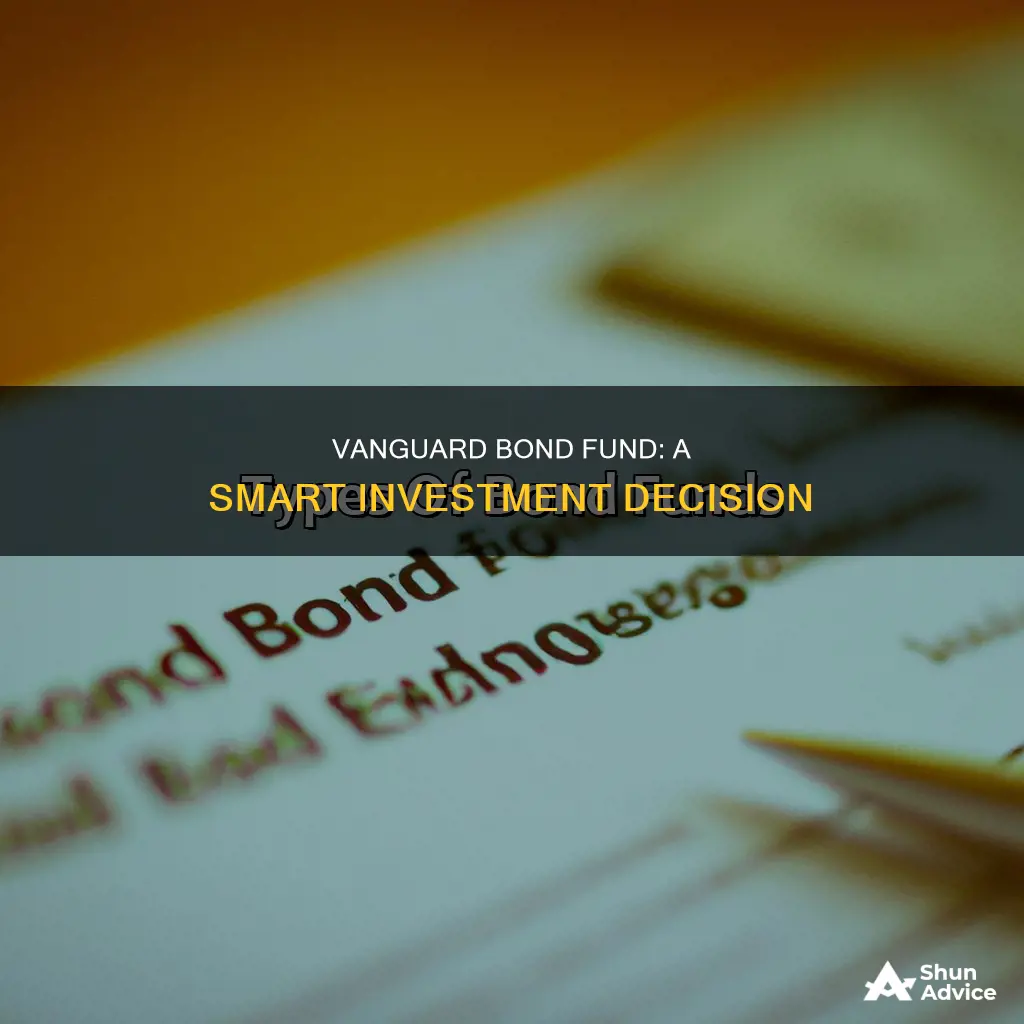
Investing in Vanguard bond funds can be a great way to diversify your portfolio and generate income with less risk compared to stocks. Vanguard offers a wide range of bond funds, including government, corporate, municipal, and international bonds, providing investors with a well-diversified bond portfolio tailored to their specific investment goals and risk tolerance. Vanguard's bond funds also offer higher income potential and can add stability to your portfolio by balancing the risks associated with stock funds. With their low fees and simplicity, Vanguard bond funds are an attractive option for those looking to simplify their bond investments.
| Characteristics | Values |
|---|---|
| Number of bond funds | 114 |
| Types of bond funds | Mutual funds, exchange-traded funds (ETFs) |
| Bond types | Government, corporate, municipal, international |
| Credit quality | Depends on the bond, rated by independent agencies |
| Maturity | Short- ,intermediate,-long-term |
| Risk | Interest rate risk, credit risk, inflation risk, country/regional risk, currency risk |
| Taxation | Federal, state, local, alternative minimum tax (AMT) |
| Minimum investment | $1,000, $3,000, $5,000, $70 per share |
| Commissions | $1 per $1,000 face amount ($250 maximum), $25 broker-assisted fee for secondary trades |
| Management | Actively managed, professionally managed |
What You'll Learn

Vanguard bond funds offer simplicity and low fees
Vanguard's bond funds, such as the Vanguard Total Bond Market Index Fund (VBMFX), have democratized the bond market by offering a mutual fund structure that leverages a transparent index. This approach aggregates numerous bonds into a single, diversified portfolio, making it more accessible to retail investors with lower minimum investment requirements. Vanguard's funds provide exposure to various bond types, including government, corporate, municipal, and international bonds, allowing investors to create a well-diversified bond portfolio aligned with their specific investment goals and risk tolerance.
The company's low-cost approach is widely recognised, with their funds often having lower expense ratios compared to their peers. For example, the Vanguard Total Bond Market Index Fund Admiral Shares (VBTLX) offers a highly diversified portfolio spanning thousands of government treasuries, mortgage-backed securities, and investment-grade corporate bonds, with a yield to maturity of 4.6% and a duration of six years, all for a 0.05% expense ratio.
Vanguard's bond funds also cater to different maturity preferences, with options like the Vanguard Long-Term Treasury ETF (VGLT) offering protection against recession and the Vanguard Ultra-Short Bond ETF (VUSB) focusing on shorter-maturity instruments, providing insulation from interest rate risk. Additionally, their funds address tax considerations with offerings like the Vanguard Tax-Exempt Bond Index Fund Admiral Shares (VTEAX), which can help reduce tax exposure for investors in high tax brackets.
With over 100 bond funds to choose from, Vanguard provides investors with simplicity, low fees, and a diverse range of options to meet their specific needs, making them a compelling choice for those seeking to invest in bond funds.
Short-Term Bond Funds: A Safe Investment Haven
You may want to see also

They are a less risky alternative to stocks
Investing in Vanguard bond funds is a less risky alternative to stocks. Bonds are loans made to a government, government agency, or corporation, which they use to finance projects and other needs. The bond issuer agrees to repay you at a fixed interest rate by a specified date, or maturity.
Bonds are generally considered less risky than stocks because they are a form of debt, whereas stocks represent ownership in a company. When you own stocks, you are a part-owner of the company and can make money if the company does well. However, with bonds, you are a lender and earn interest on your investment. This means that if a company goes bankrupt, bondholders will be repaid before stockholders.
Additionally, bonds can provide a steady income stream through regular interest payments, making them a good option for those seeking fixed income in retirement or saving for a specific goal, such as a house or tuition.
Vanguard offers a wide array of bond mutual funds and exchange-traded funds (ETFs) that cater to various investor needs, including credit quality, geographic exposure, maturity, and tax considerations. Their funds provide access to a diverse range of investment-grade bonds, including government, corporate, municipal, and international bonds.
It is important to note that while bonds are generally less risky than stocks, they are still subject to interest rate risk, credit risk, and inflation risk. The value of bonds can fluctuate due to changes in interest rates, and there is always the chance that the bond issuer will fail to make payments on time. However, overall, investing in Vanguard bond funds can be a good option for those seeking a less risky alternative to stocks.
Best Vanguard Funds for Your Roth IRA
You may want to see also

They can help you save for specific goals
Investing in Vanguard bond funds can help you save for specific goals. Bonds are loans made to a government, government agency, or corporation, which they use to finance projects and other needs. The bond issuer agrees to repay you at a fixed interest rate by a specified date, or maturity. This makes them a less risky alternative to stocks, which can be beneficial when saving for specific goals.
Vanguard offers a wide range of bond funds, including government bonds, corporate bonds, municipal bonds, and international bonds. This allows investors to create a well-diversified bond portfolio tailored to their specific investment goals and risk tolerance. For example, if you're saving for retirement, Vanguard offers bond funds that provide fixed income in retirement, such as Treasury Inflation-Protected Securities (TIPS) that offer a return that fluctuates with inflation.
Additionally, Vanguard's low-cost structure can help maximize your returns, allowing you to save more effectively for your specific goals. Their funds have low expense ratios, ranging from 0.05% to 0.11%maturities, ranging from short-term to long-term, allowing you to choose the option that aligns with your savings timeline. Shorter-maturity bonds, such as the Vanguard Ultra-Short Bond ETF (VUSB), offer insulation from interest rate risk, while long-term bonds, like the Vanguard Long-Term Treasury ETF (VGLT), can provide protection during economic downturns.
Furthermore, Vanguard's bond funds provide diversification benefits, reducing the overall risk in your portfolio. By investing in a variety of bonds, you can minimize the impact of market volatility and improve your chances of achieving your savings goals.
Bond Fund Investment: Where to Begin?
You may want to see also

They offer potential tax advantages
Investing in Vanguard bond funds can offer potential tax advantages. Firstly, investors can benefit from tax-exempt municipal bonds, which are generally exempt from federal and state taxes. These bonds are issued by states and municipalities and are considered safe due to the issuer's ability to raise money through taxes. While they carry a lower risk of default than corporate bonds, it is still possible for the issuer to default.
Secondly, investors in higher tax brackets can benefit from tax-exempt bond funds. If you are investing outside of a tax-advantaged retirement account, tax-exempt bond funds can help reduce your tax exposure. For example, the Vanguard Tax-Exempt Bond Index Fund Admiral Shares (VTEAX) tracks an index of municipal bonds that are exempt from federal taxes and the alternative minimum tax (AMT). This results in a higher effective yield for investors in higher tax brackets.
Thirdly, certain types of bonds, such as Treasury Inflation-Protected Securities (TIPS), offer protection against inflation. TIPS have a return that fluctuates with inflation, ensuring that the purchasing power of your investment is preserved over time.
Lastly, investing in Vanguard bond funds can provide diversification across different types of bonds, including government, corporate, municipal, and international bonds. By holding a variety of bonds with different tax treatments, investors can optimize their tax liabilities and potentially reduce their overall tax burden.
Saudi Wealth Fund: Where is it Invested?
You may want to see also

They are a good way to diversify your portfolio
Investing in Vanguard bond funds is a good way to diversify your portfolio. Firstly, Vanguard offers a wide range of bond funds, including government bonds, corporate bonds, municipal bonds, and international bonds. This breadth of options allows investors to create a well-diversified bond portfolio tailored to their specific investment goals and risk tolerance.
Secondly, bond funds, in general, offer greater diversification than individual securities. Bond funds are similar to stock funds in that they invest in a diverse selection of investments, but they hold fixed-income securities instead of stocks. Vanguard's bond funds can contain hundreds, sometimes thousands, of bonds in a single fund, providing more diversification than owning just a handful of individual bonds.
Thirdly, Vanguard's bond funds cater to various investor needs regarding credit quality, geographic exposure, maturity, and tax considerations. This allows investors to further diversify their portfolios according to their specific requirements.
Finally, Vanguard's bond funds provide access to a diversified portfolio of investment-grade bonds at a low cost, making them an attractive option for investors looking to minimize fees and maximize returns.
Mutual Funds: Electric Vehicle Investments for the Future
You may want to see also
Frequently asked questions
Investing in a Vanguard bond fund offers greater diversification than individual bonds, as it allows you to invest in a diverse selection of fixed-income securities. This means you can reduce your investment risk by spreading your money across different loans. Vanguard bond funds are also more accessible to the average retail investor, as they have lower minimum investment amounts and are more transparent.
Investing in a Vanguard bond fund can provide you with a stable income stream and reduce the volatility you might see from owning stocks. Bond funds can also add stability to your portfolio by balancing the risks associated with stock funds. Additionally, Vanguard offers a wide range of bond types, allowing you to create a well-diversified bond portfolio tailored to your specific investment goals and risk tolerance.
As with any investment, there are risks associated with investing in a Vanguard bond fund. Bond funds are subject to interest rate risk, which means that if interest rates rise, the value of the bonds may decline. There is also credit risk, which is the chance that the bond issuer will fail to make timely payments or that negative perceptions of the issuer's ability to pay will cause the bond price to decline.







